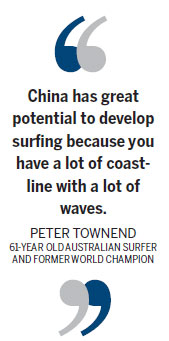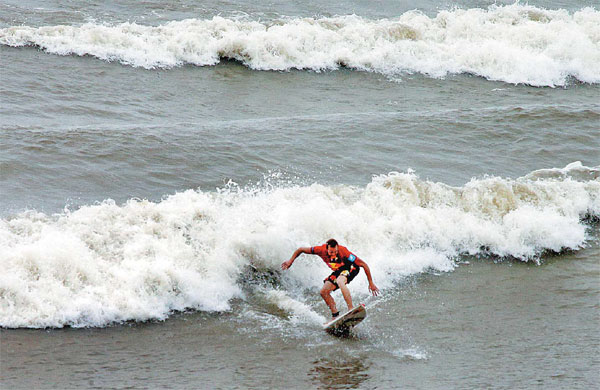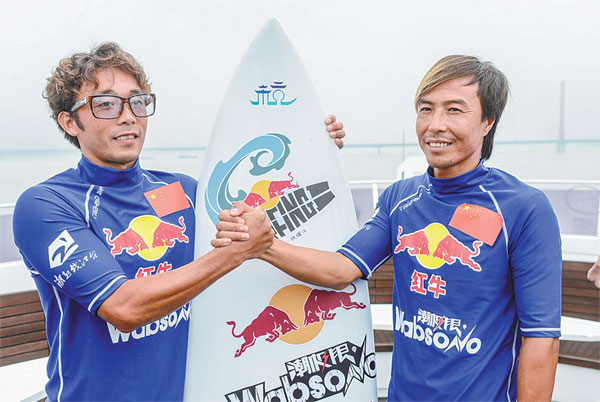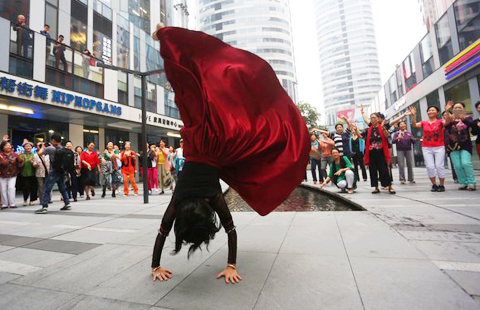Nation poised on crest of a new wave
Updated: 2014-10-10 07:51
By Xu Jingxi(China Daily Europe)
|
|||||||||||
Chinese slowly being drawn to the laidback world of surfing
Executing maneuvers such as cutbacks and hang-fives, Chen Tong-ming carved his name into surfing history when he became the first Chinese to conquer the world's largest tidal bore on the Qiantang River.
Chen, 39 from Chinese Taipei, beat Tie Zhuang, a 30-year-old surfer based in Sanya, Hainan province, in the race for that honor. The top two surfers in China underwent four days' of extensive training about jet skiing from Australian surfer Phillip Macdonald before the Red Bull Qiantang Surfing Shootout rode off on Sept 9.
|
The Qiantang Surfing Shootout attracted world-class riders from three famous surf spots - Hawaii and Huntington Beach in California, the US, and Queensland, Australia. Lin Yunlong / For China Daily |
Chen was picked by Macdonald as his partner to represent Hangzhou, Zhejiang province's capital, which the Qiantang River runs through, in the annual surfing event that was first held in 2008 as an exhibition event and then became a competition in 2012.
"It is very interesting to be the first Chinese to participate in the event. It is special to have my name in history. There is only one chance to be the first in history and that can't be bought," Chen says.
"I hope I can get invited to the event again next year and that there will be a 100 percent Chinese surfing team competing."
The shootout attracted world-class riders from three famous surf spots - Hawaii and Huntington Beach in California, the US, and Queensland, Australia. Team Hawaii won the championship, beating Team Queensland in the final on Sept 11. Team Hangzhou came third of the four teams.
Peter Townend, the Shootout's chief planner this year, decided to invite Chinese surfers for the first time and was happy to see the move bring a surge of media attention.
"The event has drawn people's attention to the sport (of surfing) and benefits its development in China," says the 61-year-old Australian surfer who won his first world championship in 1976.
"China has great potential to develop surfing because you have a lot of coastline with a lot of waves. It just hasn't been part of the culture to go to the beach, go to the waves yet."
Chen was born in Taiwan but moved to Japan at the age of four and learned surfing there. He was a skateboarder at primary school but fell in love with surfing because it gave him "a greater sense of achievement".
"You can move forward on a skateboard whenever you want by moving your feet. But you have to wait for a good wave and for the amazing power of nature to push you forward (in surfing)," he says.
Chen returned to the island at 21 because of "the great surfing environment in Kenting".
With coasts on three sides, Kenting, at the southernmost tip of Taiwan, provides surfers with waves throughout the year, Chen says.

"There are fewer surfers in Kenting than Shonan, Japan, so I can surf for longer without others jumping into my waves," he says.
Chen recalled that there were only about 10 surfers in Kenting when he settled there 18 years ago and now there are more than 100, not including those who come to the surfing hot spot from other parts of Taiwan.
The turning point came six years ago when a popular TV series, Wayward Kenting, introduced the beautiful scenery and laid back lifestyle of surfing to the general public.
Townend says Chen matched Jamie Sterling, a surfer from Hawaii who managed to ride a 20-meter-high wave, in Team Hangzhou's semifinal against Team Hawaii. However, Chen says there is still a big gap in experience between Chinese surfers and their US and Australian counterparts.
Chen is a self-taught surfer, learning maneuvers by watching videotapes of foreign stars.
"There were no skillful surfers in Kenting then, so I played the videotapes again and again to imitate their movements. I used to often get eliminated in the first round at international competitions but I would stay to watch foreign surfers and shoot videos of their performances, "he says.
Chen had not driven a jet ski before he came to Hangzhou for the Shootout. The jet ski training from Macdonald was necessary as the event requires good jet ski skills to find the right wave and send your teammate onto it.
"It is common for foreign surfers to drive a jet ski to chase huge waves but only a few people in Asia do it. We don't have coaches or equipment. We don't have the jet ski culture," he says.
"To speed up surfing's development in China we need experienced coaches. And it's better to teach kids as early as primary school. If they are really interested in the sport, they will progress very fast."
The father of two is passing on his love of surfing to his daughters, one is 13 and the other 11. He has cultivated their interest in the sport step by step, teaching them to swim, then paddling on a surfboard and then standing on it.
According to Townend, who moved to Huntington Beach in 1979, surfing is part of high school students' PE classes in the seaside city in California.
In contrast, there are about 60-70 surf clubs in Taiwan, with about 10 in Kenting, Chen says. But these clubs focus on tourists without holding classes for local children.
Townend reveals he is planning to bring Huntington Beach High School's surfing team to China next year and have a cultural exchange with Chinese teenage surfers brought to the event by Chen and Tie.
"China has its first generation of surfers, like Chen and Tie. But things will really start to change only when the second generation of surfers emerges. For example, after Tie has his child and teaches that child to surf. Now, many Chinese parents don't know what surfing is, so they won't allow their children to become surfers," Townend says.
Luckily, more and more foreign surfers and experts have been drawn to the largely untapped Chinese market and would love to help develop the sport in the country.
This year's event was Macdonald's third. Leading the Australian team, he won the championship in 2012 and was runner-up in 2013. "I've had a greater sense of achievement this year through coaching Chinese surfers. I feel like I am witnessing surfing's development in China," he says.
Nick Zanella, an Italian former surfing reporter and a consultant for the International Surfing Association and the Association of Surfing Professionals, moved to Sanya in 2010. According to Zanella, there are another five foreign surfing experts settled in the seaside city where the peak surfing season is from March to November.
He now works for Insight Adventure, an outdoor travel agency based in Hainan, and organizes surfing camps for more than 1,000 students from international schools in China every year.
"Surfing is still very young in China, like a primary school kid. But it can grow fast with a lot of surfing competitions and support from the government," he says.
"But the development takes time. We need surfing role models like Chen and Tie, we need media coverage and we need surfing schools."
Zanella estimates there are 10 surfing schools in the Chinese mainland, in stark contrast to the thousands of surfing schools in the US.
Meanwhile, Chen has set practical career goals: maintain his current ranking and coach young surfers.
"I will be 40 years old next year and am still going into competitions. I don't smoke or drink, in order to maintain good physical conditioning. But I cannot avoid getting worse as I grow older, so I don't crave a higher ranking," says Chen, whose best ranking in an international competition was fifth in the Japan leg of the ASP's World Championship Tour in 2010.
"I will surf until I die, for sure, because surfing is my life," says the man with a permanent tan.
Chen has opened a guest-house and a surf shop in Kenting and has mentored five apprentices over the past 10 years.
"I've devoted 21 years to surfing, more than a half of my lifetime. I hope to introduce the sport to more people and show the world that there are also good surfers and great places for surfing in China," he says.
xujingxi@chinadaily.com.cn
|
Chen Tong-ming (left) and Tie Zhuang at the Qiantang Surfing Shootout last month. Xu Yu / China Daily |
(China Daily European Weekly 10/10/2014 page24)
Today's Top News
On this beach no one is naked
Barrage of deals expected on Europe trip
First US Ebola patient dies
Sino-Portuguese relations make 'giant leap' forward
Holiday spending habits change
Book of Chinese president debuts at Frankfurt fair
China's 'Nightingale' races for Oscar
Britain to deploy 750 servicemen in West Africa to tackle Ebola
Hot Topics
Lunar probe , China growth forecasts, Emission rules get tougher, China seen through 'colored lens', International board,
Editor's Picks

|

|

|

|

|

|







